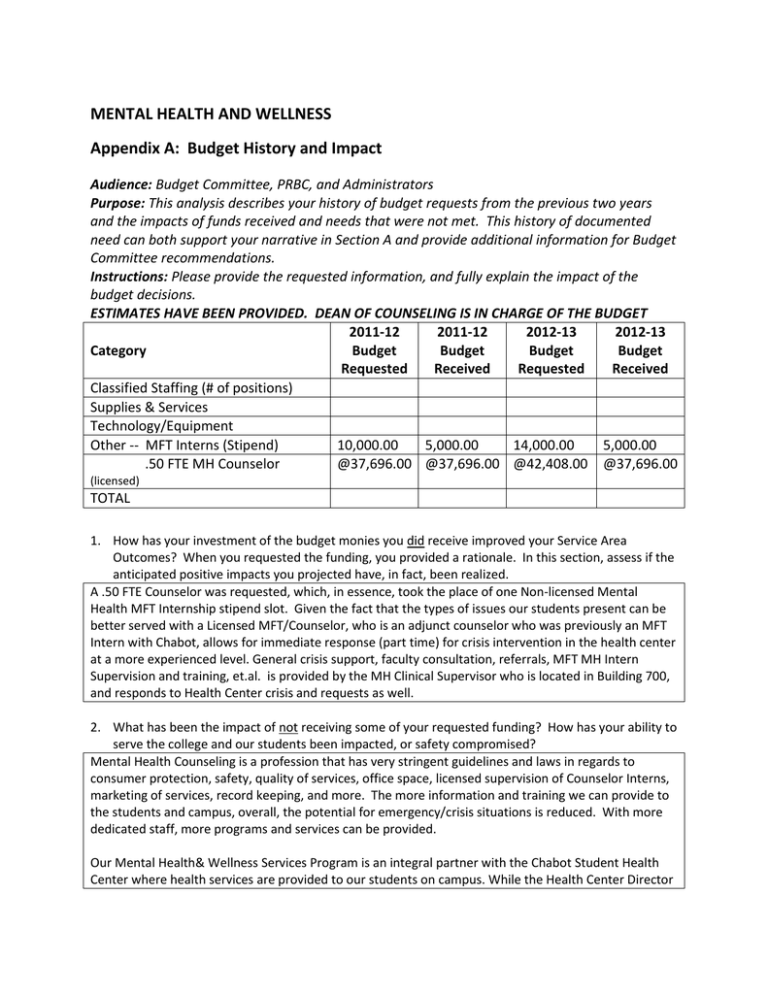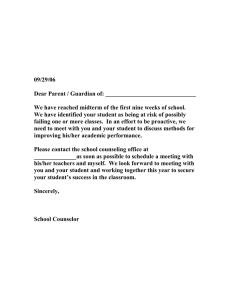MENTAL HEALTH AND WELLNESS Appendix A: Budget History and Impact
advertisement

MENTAL HEALTH AND WELLNESS Appendix A: Budget History and Impact Audience: Budget Committee, PRBC, and Administrators Purpose: This analysis describes your history of budget requests from the previous two years and the impacts of funds received and needs that were not met. This history of documented need can both support your narrative in Section A and provide additional information for Budget Committee recommendations. Instructions: Please provide the requested information, and fully explain the impact of the budget decisions. ESTIMATES HAVE BEEN PROVIDED. DEAN OF COUNSELING IS IN CHARGE OF THE BUDGET 2011-12 2011-12 2012-13 2012-13 Category Budget Budget Budget Budget Requested Received Requested Received Classified Staffing (# of positions) Supplies & Services Technology/Equipment Other -- MFT Interns (Stipend) 10,000.00 5,000.00 14,000.00 5,000.00 .50 FTE MH Counselor @37,696.00 @37,696.00 @42,408.00 @37,696.00 (licensed) TOTAL 1. How has your investment of the budget monies you did receive improved your Service Area Outcomes? When you requested the funding, you provided a rationale. In this section, assess if the anticipated positive impacts you projected have, in fact, been realized. A .50 FTE Counselor was requested, which, in essence, took the place of one Non-licensed Mental Health MFT Internship stipend slot. Given the fact that the types of issues our students present can be better served with a Licensed MFT/Counselor, who is an adjunct counselor who was previously an MFT Intern with Chabot, allows for immediate response (part time) for crisis intervention in the health center at a more experienced level. General crisis support, faculty consultation, referrals, MFT MH Intern Supervision and training, et.al. is provided by the MH Clinical Supervisor who is located in Building 700, and responds to Health Center crisis and requests as well. 2. What has been the impact of not receiving some of your requested funding? How has your ability to serve the college and our students been impacted, or safety compromised? Mental Health Counseling is a profession that has very stringent guidelines and laws in regards to consumer protection, safety, quality of services, office space, licensed supervision of Counselor Interns, marketing of services, record keeping, and more. The more information and training we can provide to the students and campus, overall, the potential for emergency/crisis situations is reduced. With more dedicated staff, more programs and services can be provided. Our Mental Health& Wellness Services Program is an integral partner with the Chabot Student Health Center where health services are provided to our students on campus. While the Health Center Director is in charge of the health program; my role and function is the Mental Health Clinical Supervisor and Program Director for the mental health program and services provided on campus. The Mental Health counseling office is located within the Health Center and allows for immediate triage services when needed. It is an extremely successful partnership maintained over the past 6+ years. The Health Center Director's program reviews over the last few years has requested and indicated the need for an expanded workspace in order to serve the increasing student demands. Our request is in concert with the SHC requests, however, specifically we will require an additional office as well as a one-way mirror installed for supervisory observation/training purposes. Two offices, side by side would allow for installation of the mirror. Without it, listening to cassette tapings of hour long counseling sessions is the only method I am left with for supervisory evaluation and training. An additional office, dedicated to Mental Health Counseling, was requested. It is required in order to increase appointment service hours for Mental Health Counseling. Two Counselors are presently sharing the one office that is now available in the Health Center and there are no available office hours for another Counselor presently. Further, the Health Center has reduced the number of hours open in the evening, which further reduces the possibility to add an additional Mental Health Intern in the present limited office space situation. Confidentiality is mandated for mental health counseling by law. (The front-desk counseling model, which has been extremely successful for academic counseling, since the budget cuts, is strictly prohibited for mental health services.) Presently there are approximately 14,000 students. The negative impact of not receiving requests for additional office and an additional MFT Mental Health Intern is as follows: Given the huge ratio of students who need mental health counseling service, the 21 hours per week for direct student contact, between the two part-time Counselors, is prohibitive and restrictive. Students who are paying rising "health fees" are not receiving the benefit of service. Contact hours (at 1 hour per student in the Health Center) is as follows: .50 FTE Mental Health Counselor 16 hrs. per week (3 hrs week admin = 13 students avail. MFT Mental Health Intern 10 hrs. per week (2 hrs week admin = 8 students avail Total: 21 Record keeping, treatment planning, and case management/progress notes are also a requirement, therefore, there are hours per week used for that purpose. Group Counseling allows for multiple students to be served within an 1.5 hour period. However, most students prefer, and receive one-to-one counseling. With the restrictions described above, the services have been severely restricted.



![COUNSELING Appendix F7: Technology and Other Equipment Requests [Acct. Category 6000]](http://s2.studylib.net/store/data/011516031_1-662e27e4a5d3bf8015927ff13c412e17-300x300.png)